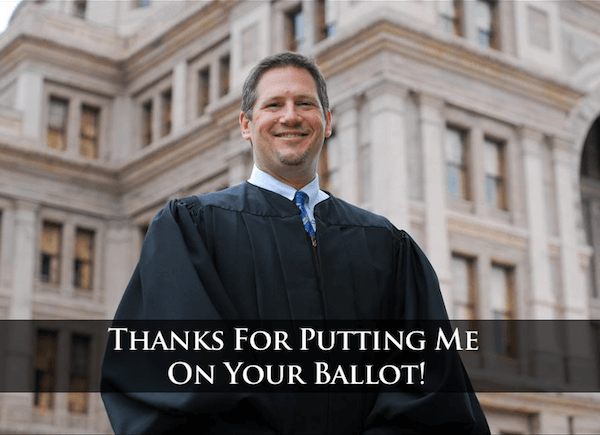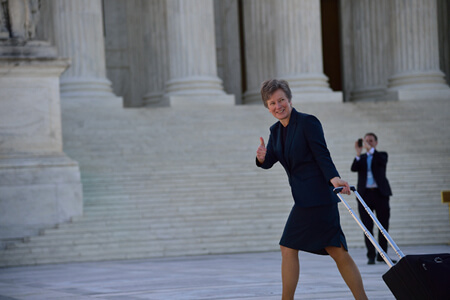Edie Windsor last June when she won her DOMA challenge at the district court. | DONNA ACETO
In two critical rulings on June 26, the United States Supreme Court struck down the US Defense of Marriage Act’s bar on federal recognition of legal same-sex marriages.
DOMA, the majority found, violates the equal protection rights of same-sex couples protected by the Fifth Amendment.
In the challenge to California’s Proposition 8, the high court ruled that the group that intervened to appeal a San Francisco district court decision striking down the 2008 voter referendum did not have standing to do so. That 2010 ruling by Judge Vaughn Walker stands, marriage by same-sex couples should be able to go forward in California soon, but that decision has no impact on the broader question of a federal right of gay and lesbian couples to marry.
Gay City News will be updating its coverage throughout the day
“DOMA singles out a class of persons deemed by a State entitled to recognition and protection to enhance their own liberty,” Justice Anthony Kennedy wrote in the 5-4 decision.
Kennedy also found, “In determining whether a law is motivated by improper animus or purpose, discriminations of an unusual character especially require careful consideration. DOMA cannot survive under these principles… The federal statute is invalid, for no legitimate purpose overcomes the purpose and effect to disparage and injure those whom the State, by its marriage laws, sought to protect in personhood and dignity.”
Kennedy’s opinion noted as well that in limiting what marriages sanctioned by states are recognized by the US government, Congress had violated federalism principles of the Constitution.
Thea Spyer and Edie Windsor with five other couples who married in Canada celebrating at New York City Hall in 2008. | GARRY RISSMAN/ GRCC
The victory came in Edith (“Edie”) Schlain Windsor’s suit challenging DOMA’s constitutionality. Windsor, a New Yorker, is the surviving spouse of Thea Clara Spyer, her partner of more than 40 years who died in 2009, two years after their marriage in Canada. Though Spyer’s death came prior to New York State’s enactment of marriage equality, in 2008 an intermediate appeals court here established a statewide precedent that legal same-sex marriages from other jurisdictions would be recognized by New York. After her death, the IRS, relying on DOMA, assessed an estate tax of more than $360,000 on Windsor for which she lacked the protection of a marital deduction available to opposite-sex couples.
Last June, US District Court Judge Barbara S. Jones granted Windsor summary judgment in her DOMA challenge, finding that the 1996 law did not meet even a minimal “rational basis” standard of constitutionality. Citing a 1996 Supreme Court ruling that struck down a Colorado voter initiative that barred any gay rights protections, Jones said her mandate was to “determine whether government’s asserted interests are legitimate,” and found they were not.
She concluded, therefore, that it was not necessary to subject DOMA to a more searching level of scrutiny generally applied only in cases of racial or gender discrimination claims.
The Second Circuit Court of Appeals agreed with Jones’ conclusion about DOMA’s constitutionality, but embraced the analysis of the Justice Department and Windsor’s attorneys that claims of sexual orientation discrimination should be evaluated using heightened scrutiny, under which the government must show a compelling justification, not merely one that can be argued is rational.
Windsor, the Justice Department, supporting her claims, and the so-called Bipartisan Legal Advisory Group (BLAG) of the House of Representatives –– a group controlled by Republican Speaker John Boehner that intervened in the case to defend DOMA –– all sought Supreme Court review in order to definitively settle the question of the law’s constitutionality.
Oral arguments on the Windsor case took place at the Supreme Court on March 27.
Chief Justice John Roberts and Associate Justices Antonin Scalia and Samuel Alito each wrote dissents, and those judges and Justice Clarence Thomas variously joined each other’s dissents.
David Boies and Ted Olson, lead attorneys on behalf of AFER, at a March 2010 TimesTalk forum in Manhattan. | COURTESY: SARA KRULWICH/ THE NEW YORK TIMES
The Proposition 8 case involved the 2008 California referendum that that overturned a State Supreme Court ruling earlier that year granting same-sex couples the right to marry.
In a 5-4 decision written by Chief Justice John Roberts, the court found that the group that intervened to defend Prop 8 did not have standing to appeal original decision striking it down.
“We have never before upheld the standing of a private party to defend the constitutionality of a state statute when state officials have chosen not to. We decline to do so for the first time here,” Roberts wrote.
In an unusual line-up of justices for an issue like this, the dissent was written by Kennedy, who was joined by Thomas, Alito, and Justice Sonia Sotomayor.
District Judge Walker’s 2010 ruling striking down Prop 8 was a sweeping 14th Amendment ruling that found a federal right to marriage for same-sex couples.
Since neither the governor nor the attorney general of California defended the voter initiative in court, that ruling was appealed by the Official Proponents of Prop 8, a group representing those who put forward the measure. Their role in the case was an issue even at the Ninth Circuit Court of Appeals, but that court in the end relied on an advisory opinion from the California Supreme Court that they were eligible under state law to defend Prop 8.
The Ninth Circuit upheld Walker’s ruling, but on narrower grounds that there was no legitimate government interest in taking away marriage rights same-sex couples already enjoyed.
At the Supreme Court on March 26, the American Foundation for Equal Rights, which represents the two plaintiff couples in the case, continued to press a broad equal protection argument but also offered an alternative argument based on the Ninth Circuit’s narrower framing of the case.




































